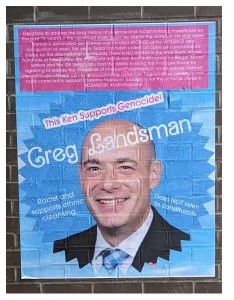Editor’s Note: (We spoke to Congressman Landsman before the end of the truce this morning)
On the morning of Nov. 28, antisemitic graffiti accusing Greg Landsman of supporting genocide and ethnic cleansing in Gaza was found on a building near the Congressman’s office in Walnut Hills.
The poster was put up by unknown pro-Palestine activists and hosts a slew of antisemitic accusations in response to Landsman’s support of Israel in its war against Hamas, the Gaza terrorist group that murdered 1,200 – mostly civilian – people in Israel on Oct. 7. The poster, modeled after imagery in the “Barbie” movie, says, “This Ken Supports Genocide.”
The poster claims that “thousands of Jews have come out to support Palestinian Freedom! Judaism is not the same as Zionism.”

“Peaceful protests can be powerful, but vandalism and dangerous rhetoric are wrong and ineffective,” said Landsman in a statement on X.
The vandals, purposefully or not, did not put the poster on the building where the Landsman’s office is. Instead, they tagged a building that is the home to a non-profit organization that helps women escape domestic violence and addiction – who then had to spend time removing the graffiti from their building, according to Landsman, whose staff helped clean the poster off.
“What they don’t realize is that for most of us to be pro-Israel, we are also pro-Palestinian and want a two-state solution,” said Landsman.
The vandalism appeared during the uneasy pause in fighting between Israel and Hamas that lasted seven days. Over that time, over 100 Israeli hostages were released by Hamas, while 137 still remain in captivity.
Antisemitic incidents have skyrocketed around the world and in the U.S. since the start of the Israel-Hamas war. That trend has continued locally as well, though a recent piece from the Times of Israel noted that nearly 79% of antisemitic incidents go unreported. According to FBI statistics, Jews face the most reported hate crimes of any religious group.
“In the 12-month period before October 7, we were roughly experiencing one antisemitic incident a week,” said Ari Jun, director of the Cincinnati Jewish Community Relations Council. “Since Oct. 7, we’ve been shy of about one [antisemitic] incident a day.”
So far, most of the incidents have been slurs online or in person, or graffiti like what was postered near Landsman’s office. However, there have been multiple threats of violence as well, and the frequency of the incidents is part of what has Jun and many Jews worried.
“When you have an incident a day, at some point, one of these incidents is going to get out of control,” said Jun.
According to him, the graffiti that targeted Landsman is classic antisemitism.
“It’s targeting, specifically, a Jewish congressman for an issue related to Israel,” said Jun. “We have a control group in this case, which is Brad Wenstrup, a congressman covering this area, and is also very supportive of Israel. They’re not targeting Brad Wenstrup. They’re targeting Greg Landsman. And it’s because he’s Jewish.”
Public discussion of the Israel-Hamas War, especially online, has left little room for nuance or empathy. According to Landsman and Jun, that’s what is needed when discussing the conflict between Israelis and Palestinians.
To Jun, the poster that they attempted to leave on Landsman’s office featured one of the key ways how the discussion about Israel can often have antisemitic subtext.
“The Western world has fixated on this single crisis and labeled it a genocide despite the clear evidence that it’s not, and has been using that as a cudgel against the Jewish community – which is clearly motivated at some level by antisemitism,” said Jun. “I don’t think that every person who engages in that kind of rhetoric means to hurt Jews or knows that they’re hurting Jews. But they’ve been co-opted into a narrative that is hurtful to Jews.”
For many, the amount of antisemitic criticism of Israel has been overwhelming online, and plenty of Jews have been wanting to speak out against it. To Jun, it is important to approach any conversation with compassion and empathy and not to engage with people online, especially people you don’t know.
“You’re not going to convince a stranger online, it’s not gonna happen,” said Jun.
If folks do want to have a conversation with someone about the conflict they should do it in person.
“If you have somebody with whom you have a relationship, who you think you could have a conversation with, find a way to do it that’s not through text online,” said Jun. “It could be over Zoom, have a phone call, or meet up for coffee.”
That is the same strategy Landsman has been using since he became a congressman, he said. His office tries to reply to every email and every phone call it receives. He has been engaging with members of the community, some of whom don’t see eye to eye with him on the current conflict.
“I’ve had really intense, really important conversations, and so there has been a healthy engagement. I’ve gone and sat in people’s living rooms and places of worship and have been really glad to have…hard conversations with folks, and it has helped,” he said.
Now that the temporary truce has ended and the war has restarted in Gaza, things are likely to get worse. For Landsman, it is important to surround yourself with people who care about you.
“In times like this, it matters to be with the people you care about and who care about you,” said Landsman. “In my community here [in Washington D.C.] and back home, it includes people who don’t agree on this war and don’t see eye to eye with me, but it’s full of people who love each other and are going to work through these things together.”

